Sandra Beasley's Blog, page 12
July 22, 2013
Moving Days
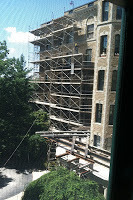 This has been a sticky, sweaty, unrepentant month of DC summer--and a month of moving. I'm not someone who takes well to liminal spaces. I speak no second languages because I can't bear the in-between of faltering, approximated phrases. I've been known to char sponges and dish towels because I start cleaning the stove before the burner is off. So it's very hard for me to function in these sprawling days; my instinct is to line up, to square away, to settle. As we have hand-carried our lives into this place, one box and bag at a time, the building itself has been mid-facelift as well. This should be our last week of scaffolding (and its accordant 8 AM wake-up call of construction clatter); the halls smell like new paint. Patience.
This has been a sticky, sweaty, unrepentant month of DC summer--and a month of moving. I'm not someone who takes well to liminal spaces. I speak no second languages because I can't bear the in-between of faltering, approximated phrases. I've been known to char sponges and dish towels because I start cleaning the stove before the burner is off. So it's very hard for me to function in these sprawling days; my instinct is to line up, to square away, to settle. As we have hand-carried our lives into this place, one box and bag at a time, the building itself has been mid-facelift as well. This should be our last week of scaffolding (and its accordant 8 AM wake-up call of construction clatter); the halls smell like new paint. Patience. 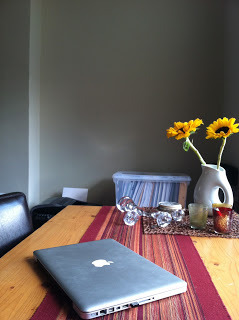 When moving, writers are always preoccupied by the question Will I be able to write here? And the panicked answer is almost always, initially, No. Or to be more precise: Noooooo. The chair I used for three books is gone, the leather seat having worn away to flakes and threads. What has been my desk now feels, more than ever, like a dining table. The overhead fan makes a regular, undeniable clicking noise. All of which has had me lying awake at night, terrified that I've Made the Wrong Decision and Will Never Write Again.
When moving, writers are always preoccupied by the question Will I be able to write here? And the panicked answer is almost always, initially, No. Or to be more precise: Noooooo. The chair I used for three books is gone, the leather seat having worn away to flakes and threads. What has been my desk now feels, more than ever, like a dining table. The overhead fan makes a regular, undeniable clicking noise. All of which has had me lying awake at night, terrified that I've Made the Wrong Decision and Will Never Write Again. The antidote to this abstract and paralyzing fear is as simple as writing, of course. I'll get there. Part of growing older is learning to ignore my inner Harbinger of Doom and Self-Doubt.
 One must take comfort in small pleasures, like pint glasses that have been chilled in the freezer beforehand, from which one drinks Boddinger's Pub Ale while muddling through hour two of sorting fifteen years' worth of cds while one sits on a bare floor. When one really should be writing. Because one is overdue on three major deadlines.
One must take comfort in small pleasures, like pint glasses that have been chilled in the freezer beforehand, from which one drinks Boddinger's Pub Ale while muddling through hour two of sorting fifteen years' worth of cds while one sits on a bare floor. When one really should be writing. Because one is overdue on three major deadlines. A beacon of encouragement has been that this will be a place where I cook. Often. Enthusiastically. There is a spice rack. The oven need not double as a storage unit for six pans. I can actually open my fridge AND my dishwasher, all the way--O the novelty! Because our apartment approximates tropical rainforest levels of humidity, and because my love works evenings, we've been experimenting with the art of the "odds & ends" lunch that consumes the day's perishables. So far my favorite has been a linguine based with onion, bacon, and red peppers, with avocado added for creaminess. Sauté all of that together with salt, pepper, and chili flakes, fold in a little spinach and squeeze in some lemon juice before serving--voila. Cooking is a creative process. If I can improvise with flavors, words will follow.
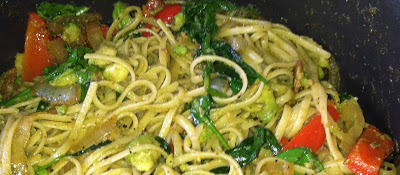
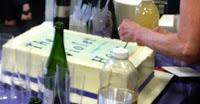 I've also relished being back in town for readings, which included hearing Katherine Hill at Politics & Prose yesterday to celebrate the release of her debut novel, The Violet Hour. Her images were tight--she has a poet's ear for metaphor, but curbs it in proportion to dialogue. The premise, a family's outing on a boat, set up the right balance of claustrophobia, humor, and tangible action. She had a standing-room-only crowd and a long Q&A; the book sold out. At her reception afterwards, Katherine's father--a fellow Board member at the Writer's Center--poured glasses of cava spiked with creme de violette, while his wife prepped a cake made in the image of the book's cover. "Did I do all right?" she asked them, which is the exact same question I ask my parents after every reading. Yes, you did, Katherine. In fact you kinda kicked ass. So thrilling when you can feel the electricity of a book that is going to be big, and deserves to be.
I've also relished being back in town for readings, which included hearing Katherine Hill at Politics & Prose yesterday to celebrate the release of her debut novel, The Violet Hour. Her images were tight--she has a poet's ear for metaphor, but curbs it in proportion to dialogue. The premise, a family's outing on a boat, set up the right balance of claustrophobia, humor, and tangible action. She had a standing-room-only crowd and a long Q&A; the book sold out. At her reception afterwards, Katherine's father--a fellow Board member at the Writer's Center--poured glasses of cava spiked with creme de violette, while his wife prepped a cake made in the image of the book's cover. "Did I do all right?" she asked them, which is the exact same question I ask my parents after every reading. Yes, you did, Katherine. In fact you kinda kicked ass. So thrilling when you can feel the electricity of a book that is going to be big, and deserves to be.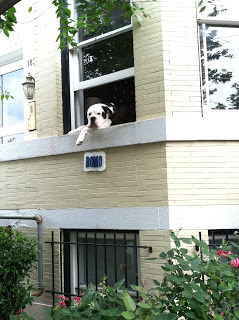 Long story short, I am laying low for a bit. Not even reading--except for the Sunday New York Times, which now miraculously appears on my doorstep each week. I am unpacking. Perspiring. Conspiring. Devising salads. Debating "lemongrass" versus "jade" as a rug color. Wondering how to curb the ripening of bananas. Re-acquainting myself with Tryst. Updating addresses in umpteen databases. Cleaning closets. Pondering file cabinets. Figuring out the most efficient elevator routes for a building with nine external doors. Meeting the new neighbors, like this epic pup, who seems to share my disposition toward this weather. Onwards. Sometimes, the secret to a move is just that you gotta keep moving.
Long story short, I am laying low for a bit. Not even reading--except for the Sunday New York Times, which now miraculously appears on my doorstep each week. I am unpacking. Perspiring. Conspiring. Devising salads. Debating "lemongrass" versus "jade" as a rug color. Wondering how to curb the ripening of bananas. Re-acquainting myself with Tryst. Updating addresses in umpteen databases. Cleaning closets. Pondering file cabinets. Figuring out the most efficient elevator routes for a building with nine external doors. Meeting the new neighbors, like this epic pup, who seems to share my disposition toward this weather. Onwards. Sometimes, the secret to a move is just that you gotta keep moving. Oh! And before I forget, I have one lil' reading in August--at Baked and Wired, my sister's favorite Georgetown spot--with some vagabonds of poetry: Justin Boening, Miriam Bird Greenberg, and John Fenlon Hogan. Justin won the Poetry Society of America's National Chapbook Fellowship with "Self-Portrait as a Missing Person," and this fall he'll be the Stadler Fellow at Bucknell University. Miriam teaches ESL in San Francisco (when not wandering) and has had stints at both P-Town and as a Stegner Fellow. John has had work popping up all over the place, including Boston Review and Quarterly West. Diana Khoi Nguyen, who is organizing it all, is a powerhouse of poetry herself, a Columbia grad and a recent Bread Loaf waiter. Frankly, I'm not sure I'm cool enough to be part of this line-up. But I'm excited to hear these new voices. The "Omission Summer Poetry Tour" stops off in DC at 6 PM on Monday, August 5, free.
Published on July 22, 2013 13:22
June 21, 2013
Workin'
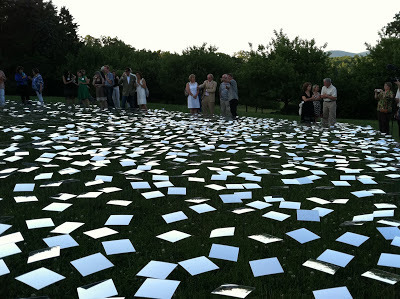
This would have felt like the longest day no matter what, because I spent seven straight hours of it completing a grant application. But it is the solstice, the literal longest day of sun all year. My hair is also long these days and right now, like a fairy-tale princess, rippled. That's because I tucked it into a bun on Wednesday while it was still soaking wet, where it then stayed for eight hours straight. Because I am Working--and it's been a while since I felt that pressure of must be clean & must look professional.
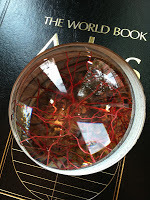 Three days a week I am going to my old office to send emails, corral files, and get things in order. A lot (books!) has happened since I last worked there, but the vocabulary of itineraries and rolos remains the same. As of late I have dusted, pitched defunct CD players, and pulled dead leaves off a valiant but struggling purple plant of unknown origin. There's several cabinets of papers to compress and label. There's about a zillion cards and letters to answer. Why is it so satisfying to do these tasks for someone else, these things we eternally put off when it comes to our own lives?
Three days a week I am going to my old office to send emails, corral files, and get things in order. A lot (books!) has happened since I last worked there, but the vocabulary of itineraries and rolos remains the same. As of late I have dusted, pitched defunct CD players, and pulled dead leaves off a valiant but struggling purple plant of unknown origin. There's several cabinets of papers to compress and label. There's about a zillion cards and letters to answer. Why is it so satisfying to do these tasks for someone else, these things we eternally put off when it comes to our own lives?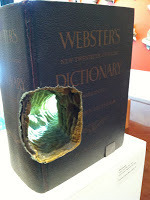
I am profoundly grateful for this opportunity to help out my former employers. We come to working together in a far better and more equitable place than before, at ease with each other's rhythms and idiosyncrasies. And frankly, it feels good to have an hourly wage again, to have stretches when my time is invested in someone else's priorities and creative output. As I type that I look around, worriedly, like someone is going to come and take my "full-time writer" license away. Eh. When I tell students of creative writing to resist falling into the assumption they must primarily teach to support themselves--to choose that path only if it truly appeals--I mean it. But everyone's got to pay the bills. In fact, I would urge those looking for work that dovetails with a writing life to investigate whether their local college has a retiring professor who needs help prepping papers for donation. It can be sneaky, fascinating work, filled with stories.
Is there a job you'd return to, if you could? Knowing what you do now?
The news has been shared elsewhere that a selection from my third collection (in the hands of editors now) has won the 2013 Center for Book Arts chapbook prize, judged by Harryette Mullin and Sharon Dolin, and will be published in a letterpress, limited edition of 100 copies come this fall. Having stood at the Center's table during many an AWP Bookfair, gazing longingly at the array, it's surreal to think my work will soon be among them. The award comes with a bit of money, which gets added to a substantial freelance assignment I'm working on right now, which gets added to my pay from the work described above, which equals a summer's worth of rent.
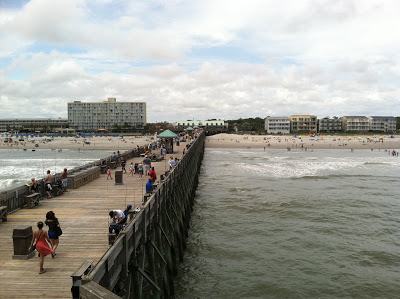
The thing is, and it's healthy to be transparent about this, no one of these gigs could be reliably multiplied into "making a living." For the one contest I won, I spent hours and $$$ applying to a half-dozen more (with many of the same poems!) to no effect. Though I expect this freelance essay to run on time, or close to it, there are several more mired in editorial limbo and therefore unpaid. I couldn't and wouldn't return to my old job five days a week; that would minimize the possibility of writing new poems, much less touring to read them. So, I juggle, which is the true task of the full-time writer. It's a Friday night, at 10:30 PM, and here I am trying to rally to get back to work.
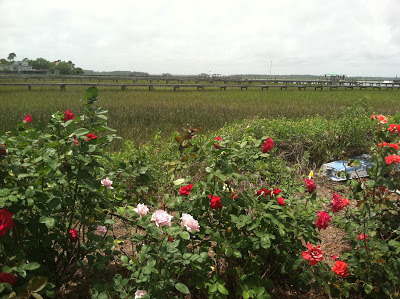
This post is not illustrated with me at a desk, or me up to my elbows in dust and bent file folders. Instead I'm sharing snapshots of "The Commission," a one-night art installation in Charlottesville, courtesy of Virginia Center for Creative Arts; a book arts exhibit at the Halsey Institute of Contemporary Art in Charleston; a glimpse of the seashore at Folly Beach, from the end of the pier; a glimpse of the marsh (and bordering roses) that line the other side of the island; and below, the set at intermission--waiting for the comedy to commence--of The Shakespeare Theatre's The Winters Tale, which I attended with my dad for Father's Day.
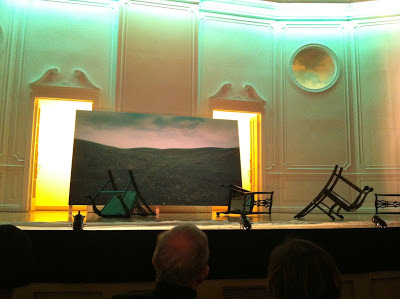 Not pictured: a sunburned shoulder, NOPA's brussels sprouts, and Star Trek: Into Darkness. These have also been a part of my crazy, busy June. That's the thing about work, though we knock it, though we whine. Work yields play. Wine tastes sweeter after a day of thirst. Let me go test that theory now, and I'll get back to you.
Not pictured: a sunburned shoulder, NOPA's brussels sprouts, and Star Trek: Into Darkness. These have also been a part of my crazy, busy June. That's the thing about work, though we knock it, though we whine. Work yields play. Wine tastes sweeter after a day of thirst. Let me go test that theory now, and I'll get back to you.
Published on June 21, 2013 19:23
May 24, 2013
Memorial Day Weekend
On Monday, I'll go my first Nationals game since back in town--Washington vs. Baltimore, kicking off a series--in the company of a poet-friend who is longtime Orioles fan, and who will wear the jersey and all. Eeek. Besmirching our section with orange and black! (Luckily even sworn enemies can come together over beer and french fries; besides, back in the family Ripken days, my father and I would trek to Camden Yards.)
As we file into the ballpark they will hand us little American flags, a reminder that it is Memorial Day. It was May 5, 1868, when a General who headed a veteran's organization called for a "Decoration Day"--decreeing that all the graves of the Union dead should be adorned--and officials chose May 30, because that was thought to be when flowers would be at the height of bloom. For 100 years it was celebrated on a fixed date. Now we celebrate it on the last-May Monday because of the "Uniform Monday Holiday Act" (yes, really) which Congress passed in 1968 to give us more three-day weekends. As Lyndon B. Johnson declared when he signed it (as the Uniform Holiday Bill), "The Monday holiday will stimulate greater industrial and commercial production, sparing business and labor the penalty of midweek shutdowns."
In an email earlier today, I was describing to a friend this strange and somewhat painful tipping point in which we fully commit to living in this year--and just as suddenly, the year's end is in sight. In two weeks I'll be in Charleston for the Piccolo Spoleto festival, a reading combined with the indulgence of getting an oceanfront room on Folly Beach for a night. Last night, over a Moscow Mule, I worked out a summer schedule to assist a mentor and old boss by returning to her office three days a week. September book travels to Nashville and Lexington are set. In November I'll be in Iowa for a Distinguished Writer gig. But that'll be with a new apartment waiting back home, to be shared with my love. By December I'll probably have to admit I have a wedding ceremony coming up, and should do some planning. For now, my thoughts on the value of weddings are captured perfectly by this excerpt from this weekend's Augusten Burroughs edition of "Modern Love":
Life never pauses. Another email I wrote today was to a friend asking for advice on freelance. What I always answer: assess your skills, network, don't be afraid to ask. What I always think: Bluff! The opportunities you get are directly proportional to the opportunities you project being accustomed to getting.
In the South, where Confederate dead might be buried miles away from home, Memorial Day was historically celebrated with a trek, perhaps a religious service, and a picnic graveside. You put a tablecloth down on the grass and you visit with your dead. In a perfect world I would take my little red, white & blue flag and, after the baseball game, drive to National Memorial Park Cemetery out on Lee Highway in Arlington. I would plant the flag by my Grandpa Marvin's grave and the sit down to chat with my Grandma Beasley. She died not that long after I had the news of my second and third books, right as I was deciding to quit my editing job and try to support myself as a writer.
It's going all right, I would start by saying, because she worries. I'd talk about my fiancé, this sweet lanky Florida-born painter, and I'd ask to hear the story about meeting my grandfather on the steps of Rice University, then reuniting with a high school sweetheart many years after being widowed. Did you actually like keeping parakeets, or was that for Joe's sake? What was the fanciest event you ever attended in DC? I'd get around to asking if she ever had eaten an avocado, if she liked them, or if that shade of green was just an abstract concept in her house. I would tell her I miss playing Scrabble. I'd ask her forgiveness for not bringing flowers the last time I saw her. I would admit that I worry, too. I would ask what songs she knew by heart.
I thought I wanted to write a book about traveling. But perhaps I already did that, in poems. Maybe now I want to write a book about staying right here.
As we file into the ballpark they will hand us little American flags, a reminder that it is Memorial Day. It was May 5, 1868, when a General who headed a veteran's organization called for a "Decoration Day"--decreeing that all the graves of the Union dead should be adorned--and officials chose May 30, because that was thought to be when flowers would be at the height of bloom. For 100 years it was celebrated on a fixed date. Now we celebrate it on the last-May Monday because of the "Uniform Monday Holiday Act" (yes, really) which Congress passed in 1968 to give us more three-day weekends. As Lyndon B. Johnson declared when he signed it (as the Uniform Holiday Bill), "The Monday holiday will stimulate greater industrial and commercial production, sparing business and labor the penalty of midweek shutdowns."
In an email earlier today, I was describing to a friend this strange and somewhat painful tipping point in which we fully commit to living in this year--and just as suddenly, the year's end is in sight. In two weeks I'll be in Charleston for the Piccolo Spoleto festival, a reading combined with the indulgence of getting an oceanfront room on Folly Beach for a night. Last night, over a Moscow Mule, I worked out a summer schedule to assist a mentor and old boss by returning to her office three days a week. September book travels to Nashville and Lexington are set. In November I'll be in Iowa for a Distinguished Writer gig. But that'll be with a new apartment waiting back home, to be shared with my love. By December I'll probably have to admit I have a wedding ceremony coming up, and should do some planning. For now, my thoughts on the value of weddings are captured perfectly by this excerpt from this weekend's Augusten Burroughs edition of "Modern Love":
For me, saying “I am married now” is like saying “I am lucky now.” I stumbled and crashed my way into the literal arms of something I never quite believed in before: my soul mate. A man who frequently smells like cheeseburgers and makes me laugh hard every day and makes me want to be worthy of being his husband.
That trumps the loss of “boyfriend” and having to withstand the silent judgment of: “Huh, so you’re the wife. I wondered how that worked.”
Getting married felt as if the city clerk was looking at us and saying, “Admit it, just admit it.” And we were smiling and laughing because it was true and we both knew it. So we each said, “Yeah, I do.”
Life never pauses. Another email I wrote today was to a friend asking for advice on freelance. What I always answer: assess your skills, network, don't be afraid to ask. What I always think: Bluff! The opportunities you get are directly proportional to the opportunities you project being accustomed to getting.
In the South, where Confederate dead might be buried miles away from home, Memorial Day was historically celebrated with a trek, perhaps a religious service, and a picnic graveside. You put a tablecloth down on the grass and you visit with your dead. In a perfect world I would take my little red, white & blue flag and, after the baseball game, drive to National Memorial Park Cemetery out on Lee Highway in Arlington. I would plant the flag by my Grandpa Marvin's grave and the sit down to chat with my Grandma Beasley. She died not that long after I had the news of my second and third books, right as I was deciding to quit my editing job and try to support myself as a writer.
It's going all right, I would start by saying, because she worries. I'd talk about my fiancé, this sweet lanky Florida-born painter, and I'd ask to hear the story about meeting my grandfather on the steps of Rice University, then reuniting with a high school sweetheart many years after being widowed. Did you actually like keeping parakeets, or was that for Joe's sake? What was the fanciest event you ever attended in DC? I'd get around to asking if she ever had eaten an avocado, if she liked them, or if that shade of green was just an abstract concept in her house. I would tell her I miss playing Scrabble. I'd ask her forgiveness for not bringing flowers the last time I saw her. I would admit that I worry, too. I would ask what songs she knew by heart.
I thought I wanted to write a book about traveling. But perhaps I already did that, in poems. Maybe now I want to write a book about staying right here.
Published on May 24, 2013 11:22
May 14, 2013
What I'd Missed About DC
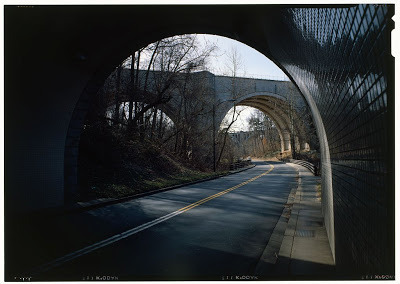
Late Saturday--after a somewhat exhausting week of prepping and sending my poetry manuscript off to my editor (fingers crossed), finishing grades for Lenoir-Rhyne University and returning portfolios, and packing up my office and the guest house--I hit the road. To be honest, I am still in panic mode in terms of a few key projects. But it is profoundly good to be home. In no particular order, ten things I had missed about DC:
-Greens by the half-pound--whether mysteriously spicy, or edibly floral--at the Dupont Circle Farmer's Market. Sampling slices of tomatoes, eyeing the ramps. Digging down for my last quarter to buy a crisp apple.
-Sitting in the Phillips Collection's Rothko Room.
-Politics & Prose! I'm overdue to splurge on a book, and/or a bowl of soup at Modern Times. Summer readings include Ru Freeman (May 20) and Lionel Shriver (June 11). They are also debuting the District Lines anthology with a reading on June 15.
-The Sunday morning concert of the carillon's bells at the National Cathedral.
-Driving the curves of Rock Creek Parkway, feeling like you've found the secret & scenic underbelly of the city.
-Quality peacock time in the open-air aviary of the National Zoo.
-Sharing Murasaki's signature sushi roll, followed by a spirited (& okay, long-winded) discussion of DC's art scene--from influence to mentorship--at a little pop-up gallery space on Wisconsin Avenue up by AU, for a series run by Jack Rasmussen.
-Trekking out to the suburbs of Virginia to have a glass of wine with my mother.
-Catching a Nats game with my dad.
-The O.B. Hardison Series, hosted at the Folger Shakespeare Theater, with the PEN/Faulkner Series a newly discovered close second. Seriously, who else emails me and says "You wanna hear Paul Muldoon on Monday?" (Or something to that effect.) And there is no better setting for readings than a historical theater's embellished stage.
Before I forget, there is a chance to attend One Last Reading for the season this Friday, May 17, at 6 PM. Adam Mansbach--yes, the guy who wrote Go the F**k to Sleep, but he's also the author of two distinguished novels--will read from Rage is Back, alongside readings by poets Joseph Ross (author of Meeting Bone Man) and Clint Smith. The themes of the night will be graffiti, including poems on Cool Disco Dan, and father and son relationships. Free! Because that's how DC rolls.
Oh, and a bonus: when I went to 2Amys to get take-out for a Mother's Day meal with my family, the manager taking orders said, "Sandra Beasley! We went to elementary school together." And sure enough, I remembered him--a much redder-haired little kid version of him circa 20 years ago. Because that's what happens when you stay.
Published on May 14, 2013 02:41
April 29, 2013
Find What You Love &...Then What?
Today I am thinking about the artistic life, in which discipline and excess are so often flip sides of the same coin. I recently stumbled across an essay on The Guardian's music blog by concert pianist James Rhodes, who advises us to "Find What You Love and Let It Kill You." This is how he begins:
In pursuit of a career in music, Rhodes later says "Admittedly, I went a little extreme – no income for five years, six hours a day of intense practice, monthly four-day long lessons with a brilliant and psychopathic teacher in Verona, a hunger for something that was so necessary it cost me my marriage, nine months in a mental hospital, most of my dignity and about 35lbs in weight." He traces the title advice back to poet Charles Bukowski. But the specific provenance is iffy--the most credible source I've seen places the line in the context of a letter, the full text of which reads:
And one has to reconcile this advice with some of the other things Bukowski had to say about "love," which he compares here to a fleeting fog:
The pride of a full-time artist is that we make a living doing what we love. Of course, the reality is that our job then includes all kinds of things we do not love. We drown in email like everyone else. I lose sleep over my complete failure at keeping track of airline miles, Amtrak Rewards, or Hilton points. Rhodes mentions "hotel rooms, dodgy pianos, aggressively bitchy reviews"; I would add to that list eight-hour drives, coffee machines grinding mid-poem, and casual delays in what to you is critical income and to others is a piddling honorarium not worth the paperwork.
The advice to those embarking on start-up is often "Work, family, sleep--pick two." I would tweak that advice for those embarking on a full-time career in the arts, to "Location, comfort, children--pick two." If you can buck those hard choices, good on ya. I'm just being honest about what I've seen in my own experience.
But damn it, choose two. You deserve two. Whatever your choices may choose to be, they should not be to let your art kill you. Rhodes knows that, deep down. His vignette of what motivates him to stay on this difficult course is an evocation of immortality through music, the very opposite of death:
These moments of creative elation, of a communion with history, are real. To pursue them takes ego and sacrifice. Bukowski, that talented bastard, had the chutzpah to engrave on his tombstone "Don't try." What? Would Rhodes agree, given his own aggressive training? The phrase comes from a letter to John William Corrington:
You can get a longer elaboration on this idea in "So You Want to Be a Writer," a poem published posthumously in 2003. Bukowski articulates a great philosophy for the act of writing. Don't try. The best works are not motivated by the pursuit of money or fame or deadline; they cannot be forced. Your strongest art will be hard on you in its creation. Physically taxing. Emotionally consuming. You want to claim you die a little death at the end of each major revision, and I'm right there with you.
But "Don't try" is a lousy philosophy for creating a career as a writer. That's why being a full-time artist is hard. You have to have a temperament that honors the muse in the individual acts of performance or creation--then harnesses her to the cart like a work horse. I'm not entirely sure I'm cut out for it, yet. I procrastinate. I panic. I shy away from perfectly reasonable non-invasive opportunities to monetize this blog.
As I said at the outset, excess and discipline are not mutually exclusive; I would venture to say they are inextricably intertwined in creative types. We can sit at a desk or stand at an easel for five hours, enjoying refining a single small detail, then opt to drink away another five hours past the point of even the most general pleasure. We will obsessively proof a piece, but be unable to balance a checkbook. We can read an entire novel in one sitting or spend an afternoon flitting through clippings like a dilettante.
The most unfair aspect of Rhodes' essay (well written, engaging overall) is his challenge to take advantage of an imaginary six "free" hours in the day--after six hours sleep, after eight hours at an office job, after four hours of housework--to pursue the dream of being an artist. I'll be honest: if I could have gotten six hours out of each day to write in the context of employment elsewhere, I might have chosen that instead of this trapeze act. But I have these things I'm annoyingly determined to keep a part of my life: Friends. Parents. Trying a new wine flight on a breezy day. Walks through the zoo. And for every six hours I write well, in ascetic mode, there are two hours I need to fritter away first, not to mention the two hours zoned out after. That's how I free-associate the ideas that become poems or essays. "What if rather than a book club you joined a writer's club?" he asks. But reading is a critical part of my writing process. You have to gestate before you give birth.
Find what you love and prioritize it, yes. Find what you love and challenge yourself to get better at it. Find what you love and share it with a community. But don't make what you love into a pyre to throw yourself on. There are lots of things in this world that can kill us. I refuse to let my decision to choose the life of a full-time writer be one of them.
After the inevitable "How many hours a day do you practice?" and "Show me your hands," the most common thing people say to me when they hear I'm a pianist is "I used to play the piano as a kid. I really regret giving it up." I imagine authors have lost count of the number of people who have told them they "always had a book inside them." We seem to have evolved into a society of mourned and misplaced creativity. A world where people have simply surrendered to (or been beaten into submission by) the sleepwalk of work, domesticity, mortgage repayments, junk food, junk TV, junk everything, angry ex-wives, ADHD kids and the lure of eating chicken from a bucket while emailing clients at 8pm on a weekend.
[Full text here]
In pursuit of a career in music, Rhodes later says "Admittedly, I went a little extreme – no income for five years, six hours a day of intense practice, monthly four-day long lessons with a brilliant and psychopathic teacher in Verona, a hunger for something that was so necessary it cost me my marriage, nine months in a mental hospital, most of my dignity and about 35lbs in weight." He traces the title advice back to poet Charles Bukowski. But the specific provenance is iffy--the most credible source I've seen places the line in the context of a letter, the full text of which reads:
My dear,
Find what you love and let it kill you. Let it drain from you your all. Let it cling onto your back and weigh you down into eventual nothingness. Let it kill you, and let it devour your remains.
For all things will kill you, both slowly and fastly, but it's much better to be killed by a lover.
Falsely yours,
Henry Charles Bukowski
And one has to reconcile this advice with some of the other things Bukowski had to say about "love," which he compares here to a fleeting fog:
The pride of a full-time artist is that we make a living doing what we love. Of course, the reality is that our job then includes all kinds of things we do not love. We drown in email like everyone else. I lose sleep over my complete failure at keeping track of airline miles, Amtrak Rewards, or Hilton points. Rhodes mentions "hotel rooms, dodgy pianos, aggressively bitchy reviews"; I would add to that list eight-hour drives, coffee machines grinding mid-poem, and casual delays in what to you is critical income and to others is a piddling honorarium not worth the paperwork.
The advice to those embarking on start-up is often "Work, family, sleep--pick two." I would tweak that advice for those embarking on a full-time career in the arts, to "Location, comfort, children--pick two." If you can buck those hard choices, good on ya. I'm just being honest about what I've seen in my own experience.
But damn it, choose two. You deserve two. Whatever your choices may choose to be, they should not be to let your art kill you. Rhodes knows that, deep down. His vignette of what motivates him to stay on this difficult course is an evocation of immortality through music, the very opposite of death:
The indescribable reward of taking a bunch of ink on paper from the shelf at Chappell of Bond Street. Tubing it home, setting the score, pencil, coffee and ashtray on the piano and emerging a few days, weeks or months later able to perform something that some mad, genius, lunatic of a composer 300 years ago heard in his head while out of his mind with grief or love or syphilis. A piece of music that will always baffle the greatest minds in the world, that simply cannot be made sense of, that is still living and floating in the ether and will do so for yet more centuries to come. That is extraordinary. And I did that. I do it, to my continual astonishment, all the time.
These moments of creative elation, of a communion with history, are real. To pursue them takes ego and sacrifice. Bukowski, that talented bastard, had the chutzpah to engrave on his tombstone "Don't try." What? Would Rhodes agree, given his own aggressive training? The phrase comes from a letter to John William Corrington:
Somebody at one of these places...asked me:
"What do you do? How do you write, create?" You don't, I told them. You don't try. That's very important: "not" to try, either for Cadillacs, creation or immortality. You wait, and if nothing happens, you wait some more. It's like a bug high on the wall. You wait for it to come to you. When it gets close enough you reach out, slap out and kill it. Or if you like its looks you make a pet out of it.
You can get a longer elaboration on this idea in "So You Want to Be a Writer," a poem published posthumously in 2003. Bukowski articulates a great philosophy for the act of writing. Don't try. The best works are not motivated by the pursuit of money or fame or deadline; they cannot be forced. Your strongest art will be hard on you in its creation. Physically taxing. Emotionally consuming. You want to claim you die a little death at the end of each major revision, and I'm right there with you.
But "Don't try" is a lousy philosophy for creating a career as a writer. That's why being a full-time artist is hard. You have to have a temperament that honors the muse in the individual acts of performance or creation--then harnesses her to the cart like a work horse. I'm not entirely sure I'm cut out for it, yet. I procrastinate. I panic. I shy away from perfectly reasonable non-invasive opportunities to monetize this blog.
As I said at the outset, excess and discipline are not mutually exclusive; I would venture to say they are inextricably intertwined in creative types. We can sit at a desk or stand at an easel for five hours, enjoying refining a single small detail, then opt to drink away another five hours past the point of even the most general pleasure. We will obsessively proof a piece, but be unable to balance a checkbook. We can read an entire novel in one sitting or spend an afternoon flitting through clippings like a dilettante.
The most unfair aspect of Rhodes' essay (well written, engaging overall) is his challenge to take advantage of an imaginary six "free" hours in the day--after six hours sleep, after eight hours at an office job, after four hours of housework--to pursue the dream of being an artist. I'll be honest: if I could have gotten six hours out of each day to write in the context of employment elsewhere, I might have chosen that instead of this trapeze act. But I have these things I'm annoyingly determined to keep a part of my life: Friends. Parents. Trying a new wine flight on a breezy day. Walks through the zoo. And for every six hours I write well, in ascetic mode, there are two hours I need to fritter away first, not to mention the two hours zoned out after. That's how I free-associate the ideas that become poems or essays. "What if rather than a book club you joined a writer's club?" he asks. But reading is a critical part of my writing process. You have to gestate before you give birth.
Find what you love and prioritize it, yes. Find what you love and challenge yourself to get better at it. Find what you love and share it with a community. But don't make what you love into a pyre to throw yourself on. There are lots of things in this world that can kill us. I refuse to let my decision to choose the life of a full-time writer be one of them.
Published on April 29, 2013 11:11
April 17, 2013
National Poetry Month
In celebration of National Poetry Month, I would like to point out that T.S. Eliot was a spectacular talent...
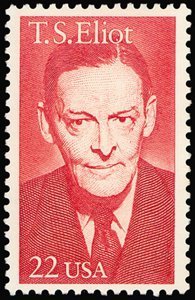
...who was just one crazy hairstyle and a cackle away from making an excellent Disney villain, as revealed here:
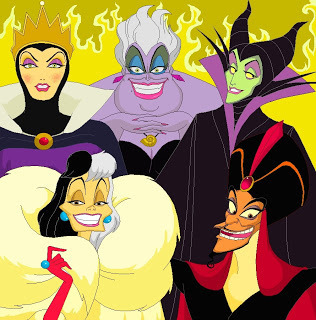
The man had some killer eyebrows, yo.
While we're teasing the greats, Leslie Pietrzyk has been sharing amazing tidbits from Kathleen Spivack's With Robert Lowell and His Circle: Sylvia Plath, Anne Sexton, Elizabeth Bishop, Stanley Kunitz & Others over at "Work-in-Progress." Read the latest post--about the time Anne Sexton and Elizabeth Bishop finally met--here.
On a different note, I've been thinking a lot lately about goals, in part as I prepare to move back to DC in later May. Being in North Carolina for a month has helped clarify my thinking about the city I've lived in and loved for over a decade. Are we a good town for literature? My answer to those who ask is usually "Yes, but we're fragmented." We only managed to merit one category of this year's City Paper awards. Some of our best and most successful writers are total recluses. It can be frustrating when great events are going on mere blocks away from each other, with no awareness.
That said, there's a renaissance going on right now. Split This Rock has become a vibrant festival that brings major poets of witness and political activism to town. The storytelling scene is blowing up thanks to buzz attached to Story League, which--founded just two years ago--now produces showcases every week in DC and New York. Representatives from organizations such as Barrelhouse, Big Lucks, 826DC, and others are hosting packed events and combining forces under the umbrella "DC Lit" (details to come). The programming staff at major institutions such as the Library of Congress, PEN/Faulkner Foundation, and the O.B. Hardison Poetry Series are great people--young and energetic, open to new ideas, approachable. This past Monday, a stolen day back home, I met up at Cleveland Park's Spices with four other women writers, two of whom have books slated to be out within the year, to share ginger salad (okay, so I hogged most of it) and toast each other's successes with sake.
In short, it is a great time for artists to live in DC. But if I'm going to stay there, I need to articulate my goals as a writer. I don't mean goals like "Write a best-seller" or "Win the Pulitzer Prize in poetry"; those are givens and, er, impossible to strategize. I mean goals for myself as part of a literary community. In some ways this is about being more selfish with my time, in some ways less. Here is what I have come up with so far:
-Create a space where I meet socially with writers once a week. Brunches and cocktail hours one on one are great, but you know what? They are a time killer. What I'd love is a comfortable venue and a group of 8-10 friends who make it a habit to show more times than not--no RSVPs needed, as long as you can get general critical mass of 5-6 people. DC has not shown itself to be good at this. People are overscheduled. My beloved Oxford, Mississippi, has this down to a science.
-Find a monthly reading series to co-host. I love hosting poets; the talent they bring to town, the manic high I get as an emcee, the opportunity it offers when chatting with folks at AWP. But I feel bad bringing someone to town when they then lose money on paying for a hotel. So, I put this out to the universe with a caveat: I need to find a way to offer them $100 honorarium per reading. Or, a place big enough to house them.
-Cement a monthly workshop group. This, I am actually lucky enough to have the makings of, but we could be a little bigger and more robust in our attendance record. The trick is to get not only likeable people, but people whose work you respect enough that when they push you, you don't get defensive. Plus, find a spot a little more atmospheric than the Pennsylvania Avenue Cosi.
-Be diligent in attending the readings that broaden my horizons, especially in terms of prose. Let go of attending the readings that will not. 'Nuff said.
-Develop a relationship with a local school. I have fond memories of the "poetry lady of Fairfax County Public Schools," a.k.a. Rose MacMurray, and I'd like to pay it forward. But I'll be blunt--too many times I've experienced flakiness. The date gets changed at the last minute because of testing. We're meeting in a classroom with 15 students; no, it's the auditorium, with 60. The students haven't gotten the handout in advance. There's no water. There's no microphone. I'm really not the diva type but I'd like to have a stable, ongoing relationship with a school that does right by their kids--and their guests.
-Become a regular at a spots...that is, a regular "do not disturb." I used to be really good at this. Tryst, Teaism, or Kramerbooks: you could always find me with a pot of tea or a beer, and a stack of poems to workshop or an essay to edit or a book I'm determined to finish. Somewhere along the way I lost this habit, in which location = accomplishing work, and I miss it. I have my eye on Soho Coffeehouse or Modern Times at Politics and Prose as the next incarnations of my "office."
Obviously, I'm a list-maker at heart. It is how I get to where I need to go in the otherwise directionless world of being a full-time writer. What are your literary goals? Does the place you live help satisfy them?

...who was just one crazy hairstyle and a cackle away from making an excellent Disney villain, as revealed here:

The man had some killer eyebrows, yo.
While we're teasing the greats, Leslie Pietrzyk has been sharing amazing tidbits from Kathleen Spivack's With Robert Lowell and His Circle: Sylvia Plath, Anne Sexton, Elizabeth Bishop, Stanley Kunitz & Others over at "Work-in-Progress." Read the latest post--about the time Anne Sexton and Elizabeth Bishop finally met--here.
On a different note, I've been thinking a lot lately about goals, in part as I prepare to move back to DC in later May. Being in North Carolina for a month has helped clarify my thinking about the city I've lived in and loved for over a decade. Are we a good town for literature? My answer to those who ask is usually "Yes, but we're fragmented." We only managed to merit one category of this year's City Paper awards. Some of our best and most successful writers are total recluses. It can be frustrating when great events are going on mere blocks away from each other, with no awareness.
That said, there's a renaissance going on right now. Split This Rock has become a vibrant festival that brings major poets of witness and political activism to town. The storytelling scene is blowing up thanks to buzz attached to Story League, which--founded just two years ago--now produces showcases every week in DC and New York. Representatives from organizations such as Barrelhouse, Big Lucks, 826DC, and others are hosting packed events and combining forces under the umbrella "DC Lit" (details to come). The programming staff at major institutions such as the Library of Congress, PEN/Faulkner Foundation, and the O.B. Hardison Poetry Series are great people--young and energetic, open to new ideas, approachable. This past Monday, a stolen day back home, I met up at Cleveland Park's Spices with four other women writers, two of whom have books slated to be out within the year, to share ginger salad (okay, so I hogged most of it) and toast each other's successes with sake.
In short, it is a great time for artists to live in DC. But if I'm going to stay there, I need to articulate my goals as a writer. I don't mean goals like "Write a best-seller" or "Win the Pulitzer Prize in poetry"; those are givens and, er, impossible to strategize. I mean goals for myself as part of a literary community. In some ways this is about being more selfish with my time, in some ways less. Here is what I have come up with so far:
-Create a space where I meet socially with writers once a week. Brunches and cocktail hours one on one are great, but you know what? They are a time killer. What I'd love is a comfortable venue and a group of 8-10 friends who make it a habit to show more times than not--no RSVPs needed, as long as you can get general critical mass of 5-6 people. DC has not shown itself to be good at this. People are overscheduled. My beloved Oxford, Mississippi, has this down to a science.
-Find a monthly reading series to co-host. I love hosting poets; the talent they bring to town, the manic high I get as an emcee, the opportunity it offers when chatting with folks at AWP. But I feel bad bringing someone to town when they then lose money on paying for a hotel. So, I put this out to the universe with a caveat: I need to find a way to offer them $100 honorarium per reading. Or, a place big enough to house them.
-Cement a monthly workshop group. This, I am actually lucky enough to have the makings of, but we could be a little bigger and more robust in our attendance record. The trick is to get not only likeable people, but people whose work you respect enough that when they push you, you don't get defensive. Plus, find a spot a little more atmospheric than the Pennsylvania Avenue Cosi.
-Be diligent in attending the readings that broaden my horizons, especially in terms of prose. Let go of attending the readings that will not. 'Nuff said.
-Develop a relationship with a local school. I have fond memories of the "poetry lady of Fairfax County Public Schools," a.k.a. Rose MacMurray, and I'd like to pay it forward. But I'll be blunt--too many times I've experienced flakiness. The date gets changed at the last minute because of testing. We're meeting in a classroom with 15 students; no, it's the auditorium, with 60. The students haven't gotten the handout in advance. There's no water. There's no microphone. I'm really not the diva type but I'd like to have a stable, ongoing relationship with a school that does right by their kids--and their guests.
-Become a regular at a spots...that is, a regular "do not disturb." I used to be really good at this. Tryst, Teaism, or Kramerbooks: you could always find me with a pot of tea or a beer, and a stack of poems to workshop or an essay to edit or a book I'm determined to finish. Somewhere along the way I lost this habit, in which location = accomplishing work, and I miss it. I have my eye on Soho Coffeehouse or Modern Times at Politics and Prose as the next incarnations of my "office."
Obviously, I'm a list-maker at heart. It is how I get to where I need to go in the otherwise directionless world of being a full-time writer. What are your literary goals? Does the place you live help satisfy them?
Published on April 17, 2013 12:27
April 8, 2013
Very Important Poems (and Resisting Them)
The trains come through Hickory every few hours. Nothing haunting about it--the clank of freight, the chuff-chuff of speed, and always the whistles. I love it. Not much like the morning carillon of the National Cathedral, my neighbor at home, but lovely--and much livelier company around 3 AM.
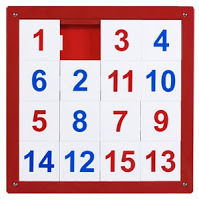
I've been focused on finalizing my manuscript. Reminds me of one of those puzzles in which you are supposed to slide squares numbered 1 through 15 back into order, except the painted numbers on these squares are has worn away--I can just barely feel the outline of their cardinal molding under my fingertips. This week I added a poem back in, which required editing it so it didn't over-echo with the poems before and after it, and which moved everything around so that suddenly another poem seemed worthy of coming back in, then a third. Turns out that first poem isn't invited back after all--it is a sestina I wrote in 2005, and just feels too young--but I suspect that if I hadn't faux-included it, and labored accordingly, that third poem would have never found its spot. So much of organizing poetry manuscripts is about liberating yourself, or tricking yourself, or both.
Of course, I wouldn't be spending all this time on order (for better or worse) if I was drafting. But a couple of attempts to write this week faltered, because I think there is only one poem left to write for this book, and I want so badly for it to be a Very Important Poem. A poem that makes the reader jump in the air, like a character in a Toyota commercial. A substantive poem that turns into a two-pager when you galley it up. A poem that ties up all this manuscript's threads of travel, of love, of loneliness, with one potent truth claim. Bah. You can't write that way. You can write a poem out filled with urgency, or mouth-watering food descriptions, or good knock-knock jokes, but beware trying to write the Very Important Poem.
To paraphrase something Jane Hirshfield said, in an interview with Michael Collier on the topic of "unearned luck," you can't bless your own poem directly; you can only acknowledge outward.
So, I need to back off, and let a poem sneak up on me. Far from DC's annual April carnival--cherry blossoms & readings galore--my way of celebrating National Poetry Month has been to prioritize time with books. I spent this week with recent collections by Philip Schultz (who I also had the pleasure of interviewing on Friday), Anne Champion, Allison Benis White, Jane Hirshfield, Mary Biddinger, and Matthew Dickman. His Mayakovsky's Revolver is particularly worth your attention.
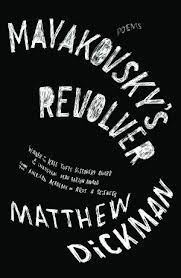
Because the collection is dedicated to Dickman's older brother, who died of an overdose, it would be easy for this collection to overflow with Very Important Poems. But Matthew Dickman neither eulogizes nor lionizes. The diction is conversational. The line breaks add energy, though there are no stanza breaks, no overt plays with form. Instead, you will be drawn in by the voice, whether proclaiming "The SUmmer's Over, Jack Spicer!" or creating an "Elegy to a Goldfish." The speaker locates lightness in pain. In Paris, we find Portland. These poems are loose and brave and funny, though the whole time you know you're on a bridge looking out over a very dark river.
WEIRD SCIENCE
Because I miss you I have made a pile of clothes
along the bed, your exact height and weight. I’ve invented
you for a night! I put the dumbbells
of my hands around the sweater that’s your waist and let them
fall asleep there. The moon is in the yard
floating through the blinds, becoming a zebra
with glowing stripes, asleep on the floor. In my fourteenth dream
about you we were in Paris. But I’m simpleminded, and also
I want to be with you in Paris! I want baguettes
and petit déjeuners. I want the rue de la Lune and hotel sheets.
French handcuffs and French bottled water. I have
added another T-shirt to you
because maybe by now you’ve had dinner. In the morning I will
attach a couple wires to the socks and boxers
that are being your head. I’ll pull down a big heavy switch
and see if you don’t rise up, moaning, your arms out
in front of you, your legs
beginning to kick, and I will hold you up and kiss you
where your mouth hurts because it’s new and was only a handkerchief.
~Matthew Dickman

I've been focused on finalizing my manuscript. Reminds me of one of those puzzles in which you are supposed to slide squares numbered 1 through 15 back into order, except the painted numbers on these squares are has worn away--I can just barely feel the outline of their cardinal molding under my fingertips. This week I added a poem back in, which required editing it so it didn't over-echo with the poems before and after it, and which moved everything around so that suddenly another poem seemed worthy of coming back in, then a third. Turns out that first poem isn't invited back after all--it is a sestina I wrote in 2005, and just feels too young--but I suspect that if I hadn't faux-included it, and labored accordingly, that third poem would have never found its spot. So much of organizing poetry manuscripts is about liberating yourself, or tricking yourself, or both.
Of course, I wouldn't be spending all this time on order (for better or worse) if I was drafting. But a couple of attempts to write this week faltered, because I think there is only one poem left to write for this book, and I want so badly for it to be a Very Important Poem. A poem that makes the reader jump in the air, like a character in a Toyota commercial. A substantive poem that turns into a two-pager when you galley it up. A poem that ties up all this manuscript's threads of travel, of love, of loneliness, with one potent truth claim. Bah. You can't write that way. You can write a poem out filled with urgency, or mouth-watering food descriptions, or good knock-knock jokes, but beware trying to write the Very Important Poem.
To paraphrase something Jane Hirshfield said, in an interview with Michael Collier on the topic of "unearned luck," you can't bless your own poem directly; you can only acknowledge outward.
So, I need to back off, and let a poem sneak up on me. Far from DC's annual April carnival--cherry blossoms & readings galore--my way of celebrating National Poetry Month has been to prioritize time with books. I spent this week with recent collections by Philip Schultz (who I also had the pleasure of interviewing on Friday), Anne Champion, Allison Benis White, Jane Hirshfield, Mary Biddinger, and Matthew Dickman. His Mayakovsky's Revolver is particularly worth your attention.

Because the collection is dedicated to Dickman's older brother, who died of an overdose, it would be easy for this collection to overflow with Very Important Poems. But Matthew Dickman neither eulogizes nor lionizes. The diction is conversational. The line breaks add energy, though there are no stanza breaks, no overt plays with form. Instead, you will be drawn in by the voice, whether proclaiming "The SUmmer's Over, Jack Spicer!" or creating an "Elegy to a Goldfish." The speaker locates lightness in pain. In Paris, we find Portland. These poems are loose and brave and funny, though the whole time you know you're on a bridge looking out over a very dark river.
WEIRD SCIENCE
Because I miss you I have made a pile of clothes
along the bed, your exact height and weight. I’ve invented
you for a night! I put the dumbbells
of my hands around the sweater that’s your waist and let them
fall asleep there. The moon is in the yard
floating through the blinds, becoming a zebra
with glowing stripes, asleep on the floor. In my fourteenth dream
about you we were in Paris. But I’m simpleminded, and also
I want to be with you in Paris! I want baguettes
and petit déjeuners. I want the rue de la Lune and hotel sheets.
French handcuffs and French bottled water. I have
added another T-shirt to you
because maybe by now you’ve had dinner. In the morning I will
attach a couple wires to the socks and boxers
that are being your head. I’ll pull down a big heavy switch
and see if you don’t rise up, moaning, your arms out
in front of you, your legs
beginning to kick, and I will hold you up and kiss you
where your mouth hurts because it’s new and was only a handkerchief.
~Matthew Dickman
Published on April 08, 2013 06:41
March 27, 2013
Snapshot

In another month, the semester will be winding down and my students at Lenoir-Rhyne University will give a public reading of their work. It has to be during the day, so as to not exclude those with jobs; I think we're going to hijack our last class of the semester. That allows those within driving distance to invite their parents to attend, and I want that for them. Some of my students come from conservative families--more than one has a preacher for a father--for whom poetry is not part of the daily dialogue. Most are on their way to more practical jobs in sociology, teaching, or law.
The first time my father heard me read poetry at the University of Virginia, there was snow on the ground. I crouched in the passenger seat of his 1987 Chrysler LeBaron, blowing on my bare hands, waiting for the heat to start working. I hated that car. The door lacked a secondary brace to hold it open, invariably slamming shut on my calf before I'd fully sat down. The dashboard display was digital and tended to short out. He'd bought it for $1000 off the street. He'd bought it so he could lend me the safer, plusher Grand Marquis to make my grocery runs and highway drives.
Did my father feel nostalgic, returning to Grounds? He'd attended UVA for a year, part of the winding path through several colleges and Army service. He'd been part of a drama production that staged T.S. Eliots "Murder in the Cathedral" in the chapel.
Did we eat dinner beforehand on The Corner? I can't remember, though I can tell you what I ate if we did. We went to Michael's Bistro and I ordered the Thai chicken curry with apricot chutney and basmati rice. This was in the earliest days of my expeditions to restaurants. I found the one dish that was Sandra-friendly, and I stuck to it.
The reading took place in a student lounge I had never been to, over in the heart of New Dorms. The space was modest--a corner of bare floor and a standing mic were all that delineated the stage from the audience, which was a cluster of stackable chairs. The faces in the crowd were mostly unfamiliar, walk-ins who'd found the ping-pong tables were taken. None of my friends had trekked over from Brown College on such a cold night. I saw one person I vaguely recognized as an editor for one of the literary magazines on grounds. My name was called, and I took a deep breath.
I read two poems I had written in my workshop with Debra Nystrom. One was about a crash that had taken place at an intersection near our home in Vienna, where a station wagon had been totaled, killing a mother and all four children she drove for her carpool. The other was this:
STATIC
After he rapes her, he goes by the 7-11.
His tennis shoes squeak on the linoleum tile;
he ducks a little, embarrassed, cursing the rain,
picking up a Diet Coke, rubbing at a stain that
lingers on his jean jacket, diving deep into his right pocket,
bringing out a mass of moist matted lint and little things: his wedding ring,
which he puts back on, a ticket stub, a wad from which he unfurls
a ten dollar bill. Smiling, he takes his change and walks out,
driving home in a mud-spattered Honda, moving on but,
shivering, she has yet to move.
Was my voice shaky? Probably. I know my hands were. I instantly regretted my choices, wishing I'd chosen something funny or at least happy. But I'd chosen what I thought were my best poems. I wanted to impress him.
My dad drove two hours to Charlottesville to hear me read five minutes' worth of poetry. Maybe he knew, even then, that he would not be able to convince me to go into law or psychology or politics or any of the thousand important fields he believed I could succeed in. He listened to his eldest daughter as she followed a rapist to a convenience store. He clapped the loudest of anyone. Then he drove back to DC.
Published on March 27, 2013 08:02
March 17, 2013
The Next Big Thing
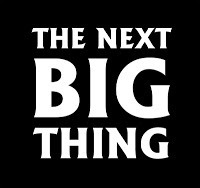 Okay, I gotta say: I am wary of the phrase, "The Next Big Thing," that titles this blog post. What does it mean for a writing project to be "big"? At what point is a book born? I worry that if I fixate on it being born, that means it can die. I worry about jinxes.
Okay, I gotta say: I am wary of the phrase, "The Next Big Thing," that titles this blog post. What does it mean for a writing project to be "big"? At what point is a book born? I worry that if I fixate on it being born, that means it can die. I worry about jinxes. That said, I've enjoyed the opportunity to read about everyone's latest writing projects. Plus, Lisa Russ Spaar asked me to take part--you can read about her wonderful new collection, The Hide-and-Seek Muse, here--and I never say no to the wondrous Lisa. So here I am.
What is your working title of your book?
"Instantaneous Letter Writer," which is a phrase from the ungainly title of an 1853 book that partially inspired this collection, The Traveler's Vade Mecum; Or, Instantaneous Letter Writer, By Mail Or Telegraph, For The Convenience Of Persons Traveling On Business Or For Pleasure, And For Others, Whereby A Vast Amount Of Time, Labor, And Trouble Is Saved.
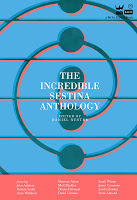 For some months the manuscript lived under the name of "Count the Waves," which was drawn from a sestina I published with Poetry magazine. I love that poem. I am loyal to it. But at some point the natural evolution of the manuscript no longer embraced its tones or focus. Poor little orphan! Luckily, I'm thrilled to report it will find a book-home in Daniel Nester's forthcoming The Incredible Sestina Anthology (Write Bloody Publishing, 2013).
For some months the manuscript lived under the name of "Count the Waves," which was drawn from a sestina I published with Poetry magazine. I love that poem. I am loyal to it. But at some point the natural evolution of the manuscript no longer embraced its tones or focus. Poor little orphan! Luckily, I'm thrilled to report it will find a book-home in Daniel Nester's forthcoming The Incredible Sestina Anthology (Write Bloody Publishing, 2013). Where did the idea come from for the book?
My first collection, Theories of Falling, draws heavily from the well of my biography and my early life. The three sections present a kind of bildungsroman: in childhood, in young love, and with a bird's-eye view to the larger culture. I Was the Jukebox, my second collection, actively pushes away from the presumptions of poet as speaker. Instead we hear from a jukebox, a piano, a minotaur, a platypus. In this collection, I wanted to strike an equilibrium by baring some personal revelations, yet also injecting some surrealist turns.
The series related to The Traveler's Vade Mecum series was inspired in part by Helen Klein Ross, who has solicited an anthology's worth of poems based on that volume. (A volume I'd love to see find a publisher....) Among other intriguing projects, Helen is on Twitter as Betty Draper. Each of my poems uses a title that is a line from that book, as if part of some greater correspondence only partially available to the reader.
What genre does your book fall under?
Poetry. I am so happy to return to poetry after writing a memoir and cultural history. I enjoy nonfiction, but I will always consider myself a poet first and foremost.
Which actors would you choose to play your characters in a movie rendition?
Oooh. If I picture an actress sitting down at a cinematic desk to scribble these poems, I picture (hope for) Tilda Swinton. She'd kick your ass and you'd thank her for it.
What is the one-sentence synopsis of your book?
This collection examines how intimacy is both lost and gained over long distances.
How long did it take you to write the first draft of your manuscript?
That's difficult to calculate; especially because there is no discrete "first draft"-ing process, just an endless series of massages and edits and reorderings. But I can say that the first poem I wrote that I knew belonged in "the next big thing" was "Parable," which I wrote in order to have something new to read at a Thacker Mountain Radio performance that took place on October 28, 2010. The first time I had the confidence to push-pin pages to the walls and tackle the manuscript as a book was in January 2012, at Virginia Center for Creative Arts. VCCA is, and will always be, such a valuable place for me. Much of "The Traveler's Vade Mecum"-inspired series was conceived there.
What other books would you compare this story to within your genre?
I'm aware of others who have used the epistolary conceit, but there is no one I have apprenticed myself to in that regard. Two poets on my mind during the drafting for this book were Jack Gilbert and Jane Hirshfield. I enjoy poems that make truth claims--bold statements about how the world works--and it is something I aim for in my work.
Who or what inspired you to write this book?
Poems come from an aggregation of lightning bolts and life experiences. Since 2010, I've put in more than 60,000 miles on the road. Any great surprise I would write about travel, about hunger? Love. Love stretched thin, so thin you see morning light through it. Salt. Oysters. Bacon. Scotch. Otis Redding. Walking. Dancing. The stars. The dirt.
What else about your book might pique the reader's interest?
You need to read what makes the hair stand up on the back of your neck. I won't tell you to read this book. I can only tell you that I'm trying to write those poems.
You can read a quartet of poems from the TVM sequence over at Virginia Quarterly Review. Thanks again to Lisa for the invitation; my fellow tagged poets are Mary Ann Samyn and Kiki Petrosino, who will be posting later this month.
Published on March 17, 2013 19:50
March 4, 2013
The Ides and AWPs of March
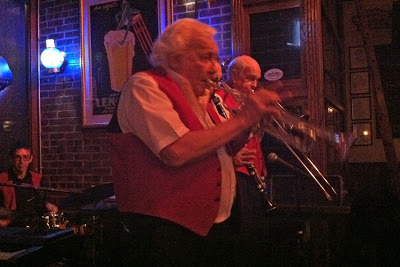
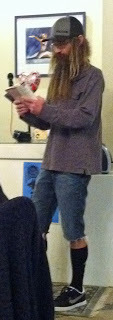 February, you were a good month. I cooked in this home-away-from-home kitchen for the first time, a braised chicken-and-veggie thing that turned into a stew. I heard a lil' New Orleans jazz on Fat Tuesday. I played cornhole with Nick Flynn after a screening of Being Flynn. I tried all the beers at the Olde Hickory Tap Room. I saw Ted Pope (right) give a high-voltage reading that involved paper-throwing and, at one point, push-ups. I read for Lenoir-Rhyne University in front of a crowd that included my students and in one case, my student's parents, though, sadly, I did no push-ups.
February, you were a good month. I cooked in this home-away-from-home kitchen for the first time, a braised chicken-and-veggie thing that turned into a stew. I heard a lil' New Orleans jazz on Fat Tuesday. I played cornhole with Nick Flynn after a screening of Being Flynn. I tried all the beers at the Olde Hickory Tap Room. I saw Ted Pope (right) give a high-voltage reading that involved paper-throwing and, at one point, push-ups. I read for Lenoir-Rhyne University in front of a crowd that included my students and in one case, my student's parents, though, sadly, I did no push-ups. Also a lot of things that I can't share yet. A teaching fellowship. An award. A big byline, forthcoming. I'm the little kid who presses her lips together, mmm mm mmmm, shaking her head and standing tippy-toe: that's how much I want to share things with you. But until I have contracts in hand, no. I know how annoying that little kid is, hence my silence here. So we give you a little pause of remembrance, February...
...and we get back to the business of this blog.
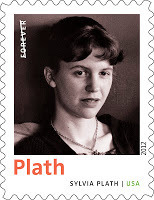 AWP is nigh. On Tuesday I'll drive to DC; on Wednesday, to Boston. Neither rain, nor snow, nor sleet, nor hail shall keep me from being there to moderate Thursday's 1:30 PM panel, "Lady Lazarus and Beyond: The Craft of Sylvia Plath," which will feature the voices of Tara Betts, C. Dale Young, Shara Lessley, Meghan O’Rourke. I pitched this panel out of a strong belief someone needed to pitch this panel, in the 50th anniversary of Plath's death. The caliber of writers who agreed to take part is a reflection of the potency of her work and influence. Please join us; we'll be at the Hynes Convention Center, Room 203, Level 2.
AWP is nigh. On Tuesday I'll drive to DC; on Wednesday, to Boston. Neither rain, nor snow, nor sleet, nor hail shall keep me from being there to moderate Thursday's 1:30 PM panel, "Lady Lazarus and Beyond: The Craft of Sylvia Plath," which will feature the voices of Tara Betts, C. Dale Young, Shara Lessley, Meghan O’Rourke. I pitched this panel out of a strong belief someone needed to pitch this panel, in the 50th anniversary of Plath's death. The caliber of writers who agreed to take part is a reflection of the potency of her work and influence. Please join us; we'll be at the Hynes Convention Center, Room 203, Level 2.There are pretty great guides to the AWP experience floating around the web. Ploughshares offers a multiple-author overview (Matt Bell: "don’t approach a literary magazine’s table at the book fair as a submitter—approach it as a fan"). Rebecca Hazelton Stafford constructs a stream-of-consciousness narrative of bookfairing. ("There are 600 exhibitors. There are two levels to the book fair. The odds of having to actually make eye contact are almost nil. You can totally do this.") Cameron Witbeck itemizes absurdist steps to "Win AWP" for Passages North. Er, I hope it is absurdist; if you see me gnawing my third Blow-Pop in an hour, and/or climbing a tree to survey the crowd, you'll know he has proven sadly prescient.
This is not my first time at the AWP rodeo. I've been the person taking notes in the front row; I've been the person who gets sick on the first day; I've been the nervous youngin' fawning in the elevator; I've been to The Fancy VIP Penthouse reception; I've been a panelist and an offsite reader; I've tabled for four hours straight; I've been part of that last group in the conference hotel bar, the ones who retreat to a random floor's bank of couches by the elevators. I've made critical connections at AWP. I've been hit on. I've had poems solicited. I've been blown off in pursuit of someone more important. It's not comprehensive or universal, but this is what I know:
TEN WAYS TO MAKE YOUR AWP BETTER
-Do not make getting coffee the first hassle of every morning. The line will always take a little longer than you anticipated. Your hotel room probably has a coffeemaker; request extra packets, and use it (emblazoned to-go mugs should be a more popular form of swag at bookfair tables; I demand a Write Like a Motherfucker thermos).
-Bring your own tote bag. The AWP totes are sturdy and increasingly better designed for books, so I use them all the time. I don't want to use them in a crowd of 8,000 identical totes, because that's how bags get switched and left behind.
-If there's a writer you want to meet, go to their booksigning. The after-panel conversations get pushed out the door by the next event; people have places to get to. That half-hour booksigning is a comparative oasis of captive time, in which the author will be grateful for company and you might have a real conversation.
-By Friday late afternoon, your body will have noticed a complete lack of vegetables in your diet. Console it, please. I recommend downing a carrot juice, even if it is while on your walk to the hotel bar for a beer. Bloody marys are also an acceptable compromise.
-Change clothes once a day. Maybe you dress separately for the conditioned conference center versus chilly offsite events; maybe it's because your cute shoes can only be worn three hours at a time. Stop in the hotel room, excavate a pound of handouts and journals from your bag, wash your face, change, and journey on refreshed.
-In choosing offsite events, look to see if the venue is hosting multiple readings that night. Be aware that intoxicated folks will linger from earlier receptions, congregating at the back and chattering loudly; they're done listening for the day. This may make your offsite event, no matter how worthy the journal, too un-fun to be worth the trek.
-Stock up on a bottle of red wine or whiskey, something share-able that doesn't require refrigeration, and on your first day ask housekeeping for some extra paper cups. There will be that one night when you want to keep talking with a few folks, but the bars are closed and/or you're all feeling poor. Being supplied is a gamechanger.
-I know the bookfair is overwhelming. But if you stop in for one reason, let it be to swing by the tables for journals that have published you in this past year, to say thanks. Don't hold out for the editor-in-chief; this is not about networking. Thank anyone who is there, profusely. Tell them what publication means to you. It will make their day.
-If you spot a Very Famous Writer in the wild, it's okay to want to say hello. But some moments are better than others. Surrounded by a gaggle of younger folks, probably students: Yes. Heading into or out of the bathroom: No. (I've BEEN that fan.)
-Treat yourself to one nice meal by yourself, if not at the conference then soon after. Get out your manuscript--short story, poetry collection, essay--and read it with eyes informed by all you've seen at AWP. If you're not in an editing mood, brainstorm a list of writing goals for the next two years. You really will see new possibilities and have fresh insights, which is why this maelstrom is worth it. Honor the fact that while the hobnobbing, hijinks, and gossip are fun, at the end of day it really is about the writing.
When I return to North Carolina, I'm going to resist post-AWP collapse. (The secret: an IV of orange juice.) On Tuesday, March 12, I'll be reading at Poetry Hickory and offering a craft seminar beforehand on "Sestinas: The Gyroscope of Form."
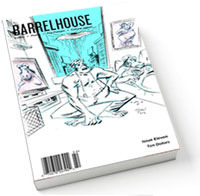 Starting March 24, I am teaching an online workshop courtesy of the good folks at Barrelhouse, whose latest issue features a cover drawn by the inimitable talent Dean Haspiel; you can read my interview with Dean here. Eight weeks, eight poems, with options for side-discussion about craft and publishing issues. You can take part as much or as little as you want--week to week, from wherever you are--working with your schedule. It's a pretty sweet deal. Details are here, and feel free to reach out to me with any questions.
Starting March 24, I am teaching an online workshop courtesy of the good folks at Barrelhouse, whose latest issue features a cover drawn by the inimitable talent Dean Haspiel; you can read my interview with Dean here. Eight weeks, eight poems, with options for side-discussion about craft and publishing issues. You can take part as much or as little as you want--week to week, from wherever you are--working with your schedule. It's a pretty sweet deal. Details are here, and feel free to reach out to me with any questions.I've missed you guys. If you see me in Boston, say hello.
Published on March 04, 2013 11:21



